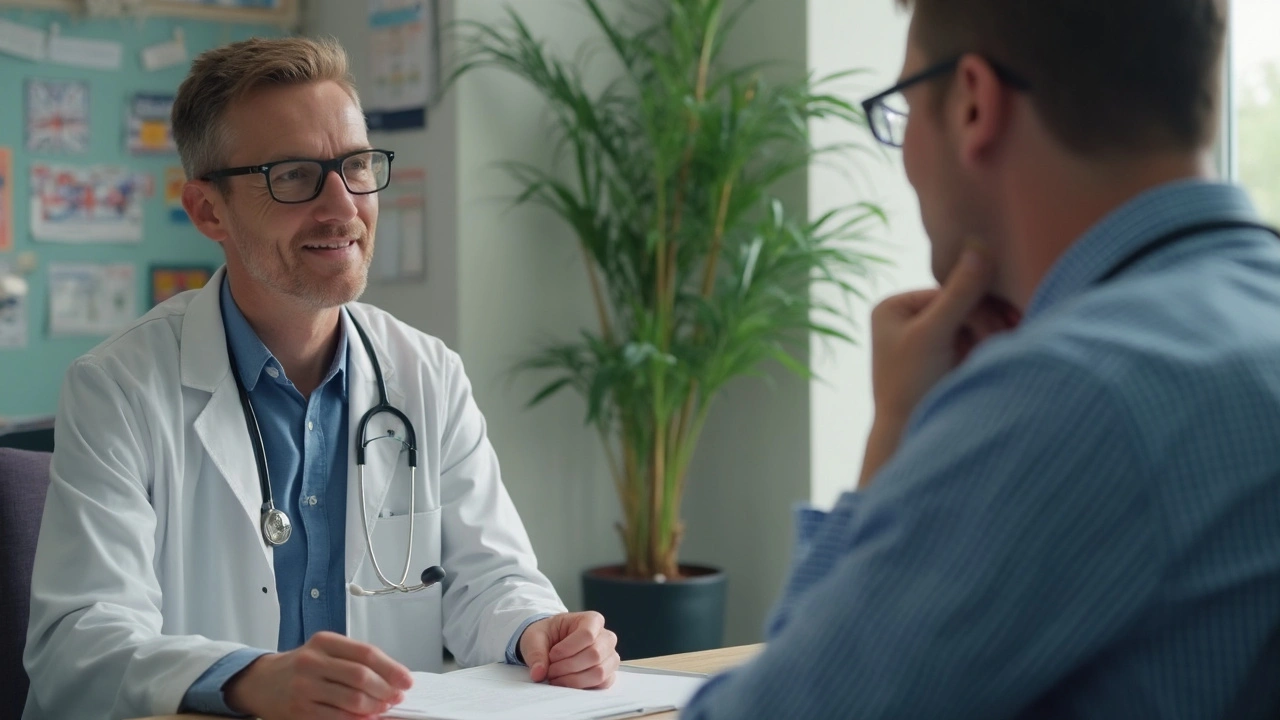If you’ve just started trazodone or thinking about it, you’re probably wondering how it might mess with your sex life. You’re not alone—this is one of the first questions people ask about antidepressants. The truth? Trazodone can cause sexual side effects, but not in everyone—and sometimes in surprising ways.
This isn’t something people love to talk about, but it matters. Some folks say their interest in sex drops, while others notice changes in erections, arousal, or orgasm. Here’s the real kicker: trazodone sometimes gets prescribed for sleep. So, you might be taking it for insomnia and suddenly find your bedroom routine is a bit off.
So, what actually happens and why? How common is it, and what can you do if you notice changes? Keep reading, because you deserve real answers. Let’s get into what to expect and what you can do if you’re not feeling yourself.
- How Trazodone Works in the Body
- Common Sexual Side Effects to Watch For
- Who Is at Higher Risk?
- Tips for Managing Sexual Side Effects
- When to Call Your Doctor
How Trazodone Works in the Body
Trazodone is mostly known as an antidepressant, but it actually does a bit more than just help mood. It changes the way certain brain chemicals work—especially serotonin. Basically, it’s in a group called serotonergic drugs, which means it tweaks the signals that make you feel balanced or sometimes, just a little less down.
Here’s what’s happening: trazodone blocks some of the brain’s serotonin receptors while boosting others. The goal is to help your brain hang onto more serotonin, which often helps with depression or anxiety. At the same time, those shifts can throw off other things, like sexual signals, sleep cycles, and even appetite.
What some people don’t realize is that trazodone is also a popular choice for folks struggling with insomnia—not just depression. It has a sedating effect at lower doses, which means it helps people fall asleep. Sounds good, right? But whenever a drug messes with brain chemicals, especially serotonin, side effects can sneak up in places you don’t expect. Sexual function is one of the most common areas to take a hit.
Here’s a quick breakdown of the main ways trazodone acts:
- Boosts serotonin by stopping its re-absorption in the brain
- Blocks specific serotonin receptors (notably 5-HT2A and 5-HT2C)
- Has a mild effect on blocking histamine and alpha-adrenergic receptors (which partly explains why it can make you sleepy or sometimes dizzy)
One study found that around 15-20% of people taking antidepressants like trazodone notice some sexual changes. This isn’t the highest rate among all antidepressants, but it’s enough to make folks pause before starting the med. Remember, everyone’s brain is different, so some people have zero sexual side effects, others have a few, and some notice it right away.
Common Sexual Side Effects to Watch For
Let’s get straight into what people actually notice when it comes to trazodone and sex. While this medicine may not cause as many problems as some other antidepressants, it’s definitely got a reputation. For some, things are totally normal. For others, it can throw a wrench into their usual routine.
- Reduced libido: You might find you’re just not in the mood like you used to be. This can sneak up and make you wonder if it’s just stress or something more.
- Erectile dysfunction: Guys sometimes notice it’s harder to get or keep an erection. Not everyone gets this, but when it happens, it’s tough to ignore.
- Trouble reaching orgasm: This goes for any gender. Some folks say they can’t get there, or it takes much longer than it used to.
- Priapism: Here’s a weird one—trazodone can cause long-lasting and painful erections, sometimes for hours. This is rare, but it’s serious. This isn’t the kind of thing you wait out. You’d want to get to a doctor, fast.
Want some numbers? A study in the Journal of Clinical Psychopharmacology pulled together data on sexual side effects with trazodone compared to other antidepressants:
| Side Effect | How Often (Est.) |
|---|---|
| Reduced Libido | 7-12% |
| Erectile Dysfunction | up to 10% |
| Orgasm Difficulties | 8-13% |
| Priapism | <1% |
These numbers aren’t the same for everyone and can depend a lot on dose, age, and your overall health. If you notice any of these things happening, you’re not alone—and you’re not stuck with it forever. Most issues get better if you switch meds or sometimes even if your body just gets used to it.

Who Is at Higher Risk?
Not everyone on trazodone will have sexual side effects, but some people are more likely to notice them. If you want to know if you fall into a higher-risk group, here’s what we know from real patient stories and actual research.
Guys are more likely to complain about issues like trouble with erections or delayed orgasm when taking trazodone. However, women can also see changes in sex drive or trouble reaching orgasm. The risks climb if you fit into one of these categories:
- Older adults: People over 50 are generally more sensitive to side effects. It’s not just age—slower metabolism and other meds can crank up the chances of problems.
- Higher doses: Taking more than 150mg a day increases risk. The side effects sometimes show up when your dose goes up, even if things were fine at lower amounts.
- Mixing with other meds: Certain drugs (like blood pressure pills, other antidepressants, or sleeping tablets) can make sexual side effects more common or more intense.
- Existing sex problems: If you already deal with things like erectile dysfunction or low libido, trazodone can make them worse or harder to manage.
- Medical conditions: Diabetes, heart issues, depression itself—these make side effects more likely and sometimes harder to treat.
Researchers found that up to 20% of men on trazodone reported an issue with sexual function, while rates for women are a bit lower, closer to 10%. Here’s a simple breakdown of who might notice issues more often:
| Risk Factor | Chance of Side Effects |
|---|---|
| Men, 50+ | 20% or higher |
| High Dose (150mg+) | 25%+ |
| Taking Other Antidepressants | 30% |
| Women, any age | 10%-15% |
If you see yourself in these groups, it doesn’t mean you’ll definitely have problems, but you’ll want to watch out and be upfront with your doctor. Picking up on issues early can make them easier to tackle—sometimes even a dose change can help. If things aren’t right in the bedroom, don’t just power through. There are ways to work around it without ditching your treatment.
Tips for Managing Sexual Side Effects
When trazodone starts messing with your sex life, it’s frustrating. But there are things you can try to take control—without ditching your meds or just hoping things get better by themselves.
First step: Talk to your doctor. Don’t be shy or embarrassed (they’ve heard it all). Your doctor could adjust the dosage, switch when you take the pill, or even recommend a different antidepressant if the sexual side effects are really a deal-breaker.
- Timing tweaks: Some people feel fewer side effects if they take trazodone at night after sex, instead of before.
- Lower the dose: Sometimes, a lower dose is enough for your sleep or depression—and brings fewer unwanted surprises in the bedroom.
- Add-ons: Doctors sometimes prescribe a low dose of a second med (like bupropion) to help balance out sexual issues. Don’t try this on your own—the mix should be guided by a pro.
- Lifestyle upgrades: Regular exercise, a balanced diet, less alcohol, and quitting smoking all help boost libido and performance. Sounds basic, but it actually works for a lot of people.
- Keep communication open: Let your partner know what’s happening. Honest conversations cut down on stress—and that helps more than you think.
If you’re curious just how common these issues are, check out this quick snapshot from real patient data:
| Sexual Side Effect | % Reporting (approx.) |
|---|---|
| Lowered sex drive | 7-12% |
| Trouble with orgasm | 5-9% |
| Erections harder to get or keep | 2-4% |
If you end up with a specific problem, like delayed orgasm or weak erections, get specific with your doctor. Tiny tweaks in your meds can lead to major improvements.
One last thing—don’t stop trazodone suddenly just because of sexual side effects. That can actually make things worse. Always check in with your prescriber if you’re thinking about any changes.

When to Call Your Doctor
If you notice any uncomfortable sexual side effects while taking trazodone, don’t just hope they’ll disappear. Sometimes things settle down after your body gets used to the medication, but sometimes they don’t—so it’s smart to reach out if problems stick around or start to mess with your confidence, relationships, or quality of life.
It’s especially important to call your doctor right away if you notice:
- Painful or persistent erections (priapism), especially if it lasts more than four hours. This is rare, but it’s a medical emergency. Don’t wait—go to the ER if this happens.
- Sudden, severe drop in libido or no sexual desire at all that lasts more than a few weeks.
- Unable to get or keep an erection, or trouble reaching orgasm that suddenly shows up and won’t go away.
- Any sexual side effect that feels new, extreme, or stressful for you.
Here’s a quick look at how often men report some common sexual side effects from trazodone:
| Side Effect | How Common? |
|---|---|
| Decreased libido | Up to 10% |
| Erectile problems | 2–6% |
| Priapism (painful erection) | Less than 1% |
Don’t be embarrassed about bringing this up with your doctor. They’ve heard it all before and want to help. Sometimes they can lower your dose, switch you to a different antidepressant, or suggest workarounds to help things in the bedroom.
If you’re not sure whether your symptoms are serious, err on the safe side—make the call or send a message through your health portal. Leaving things unchecked can sometimes make them worse. Remember, your doctor is on your team and wants you to feel your best on and off your medication.


Sherine Mary
April 28, 2025 AT 13:25Data from several clinical trials indicate that trazodone affects serotonergic pathways in a way that can dampen sexual responsiveness in a minority of patients. The literature consistently cites a 15‑20 % incidence of libido reduction or erection difficulty, which aligns with the numbers you presented. Moreover, dose‑dependency is a real phenomenon; higher nightly doses tend to correlate with a greater probability of adverse sexual outcomes. Age and comorbid conditions further modulate this risk, making the profile non‑uniform across populations. In short, the drug’s pharmacodynamics provide a plausible mechanistic explanation for the side‑effects you described.
Monika Kosa
April 28, 2025 AT 20:21Hey there! I’ve been digging around and it seems like big pharma doesn’t exactly advertise these bedroom side‑effects, probably because they want you to keep buying the meds. 🙃 Some folks even suspect that the “sleep aid” label is just a cover to push a drug that subtly messes with hormone regulation. It’s weird how the industry can downplay something as personal as sexual function while pushing the same pill for insomnia. Keep an eye out for those hidden clauses in the prescribing info – they’re often buried deep in the fine print. Stay curious and don’t let the corporate machine dictate your health choices! 😊
Gail Hooks
April 29, 2025 AT 03:18🧠 The interplay between serotonin modulation and sexual function is a classic example of how neurochemistry mirrors our existential experience. When a molecule like trazodone shifts the balance of 5‑HT₂A and 5‑HT₂C receptors, it doesn’t just lift mood; it can also quiet the drive that propels intimacy. This duality reminds us that the mind and body are not separate realms but a continuous dialogue, each echoing the other’s changes. 🌿 From a philosophical standpoint, the very fact that a sleep‑inducing tablet can alter desire forces us to question how much of our sexuality is chemically mediated versus culturally constructed. 🤔 Moreover, the data showing a 7‑12 % drop in libido juxtaposed with a sub‑1 % incidence of priapism illustrates the spectrum of outcomes, from subtle mood shifts to acute physiological emergencies. It also highlights the importance of personalized medicine; what works for one patient’s insomnia might be disastrous for another’s relational life. 🏥 If you consider lifestyle factors, regular exercise and mindful breathing can counterbalance serotonergic dampening, acting as a non‑pharmacologic buffer. 🍃 In practice, open communication with a partner becomes a form of ethical stewardship, ensuring that the pharmacological intervention does not become a silent saboteur. 🎭 Finally, remember that every side‑effect, no matter how uncomfortable, is a data point that can guide future therapeutic design, pushing the field toward agents that separate sleep promotion from sexual suppression. 🌟
Derek Dodge
April 29, 2025 AT 10:15i guess that's kinda interesting.
AARON KEYS
April 29, 2025 AT 17:11While I understand the concerns about pharmaceutical transparency, it’s worth noting that the side‑effect profile of trazodone has been rigorously evaluated in peer‑reviewed studies. The incidence rates you cited align with meta‑analyses that show a modest increase in sexual dysfunction compared with placebo. Nonetheless, clinicians are obligated to disclose these risks, and patients should feel empowered to ask detailed questions during consultations. Clear communication, rather than speculation, remains the most effective way to navigate these issues.
Summer Medina
April 30, 2025 AT 00:08So look Ive read a lot about trazodone and honestly its kinda wild how a drug meant for sleep can mess with your bedroom life its like you take a pill to relax and then boom your libido does a nosedive the studies show like 7 to 12 percent of folks lose interest what’s crazy is that the higher doses especially over 150mg seem to push that number up to maybe 25 percent I mean that’s a big chunk of people dealing with insomnia who end up also dealing with a dip in sexual desire and it’s not just men women report trouble too its this whole hormonal cascade thing that the drug triggers and yeah the side effects can be serious like priapism though that’s super rare but still a medical emergency if it happens you gotta go to the ER right away and i think doctors should be more upfront about these risks instead of hiding them in the tiny print because patients deserve the full picture especially when it comes to something as personal as sex
Melissa Shore
April 30, 2025 AT 07:05you make a solid point about transparency it’s critical that prescribers lay out the full spectrum of outcomes in plain language no need for legalese or excessive jargon patients benefit when they understand both the sleep benefits and the potential impact on libido and performance this knowledge empowers them to weigh options and discuss alternatives like dose timing or adjunct therapies with their healthcare provider ultimately open dialogue fosters trust and better health outcomes